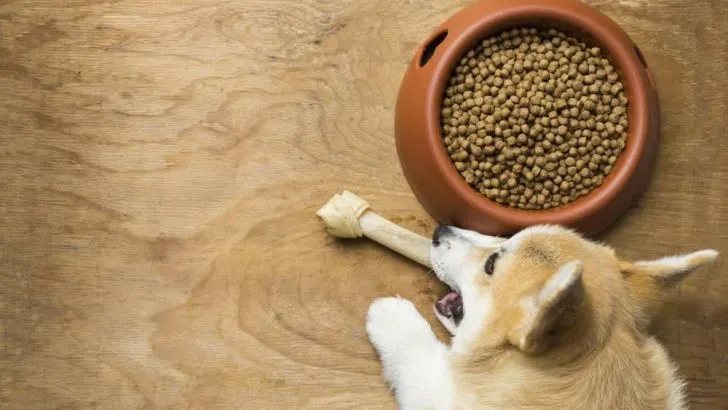All dogs love to eat, and Corgis are no exception. Whatsmore, Corgis might be one of the breeds that enjoy eating the most.
Is this a good thing or a bad thing?
One thing is certain; you will not have to worry because your beloved pet does not eat enough. Corgi owners rarely have such problems. Quite the opposite, you are more likely to have to restrict your Corgi. You’ll also struggle to resist his or her little cutesy face begging for food every time you grab something to bite.
Do you find that challenging?
You shouldn’t. If you give in to your Corgi’s pleading eyes, you’ll be doing him or her a huge disservice.
Corgis LOVE to eat and, as a result, they often have weight issues. Chubby Corgis might look cute, but they can face a number of health problems due to their excess weight. We will tell you more about that if you stick with us.
First and foremost, you need to know this: If you leave your Corgi alone with a large amount of food, you risk a lot – even the life of your pet. Namely, when left alone with an unlimited amount of grubs, your Corgi is not only highly likely to overeat, he or she can even eat himself or herself to death.
So, if your question is “Do Corgis overeat?” the answer is yes.
Remember this next time your Corgi tries to guilt you into giving him or her more food. The sad look and whining do not mean that your dog is hungry – you can say no!
If you think you cannot resist the look of adoration, just consider all the dire consequences of your Corgi overeating – it should be enough to help you stay determined and not let your pet eat off your plate.
Stay tuned to find out more about this problem and learn how to best deal with it.
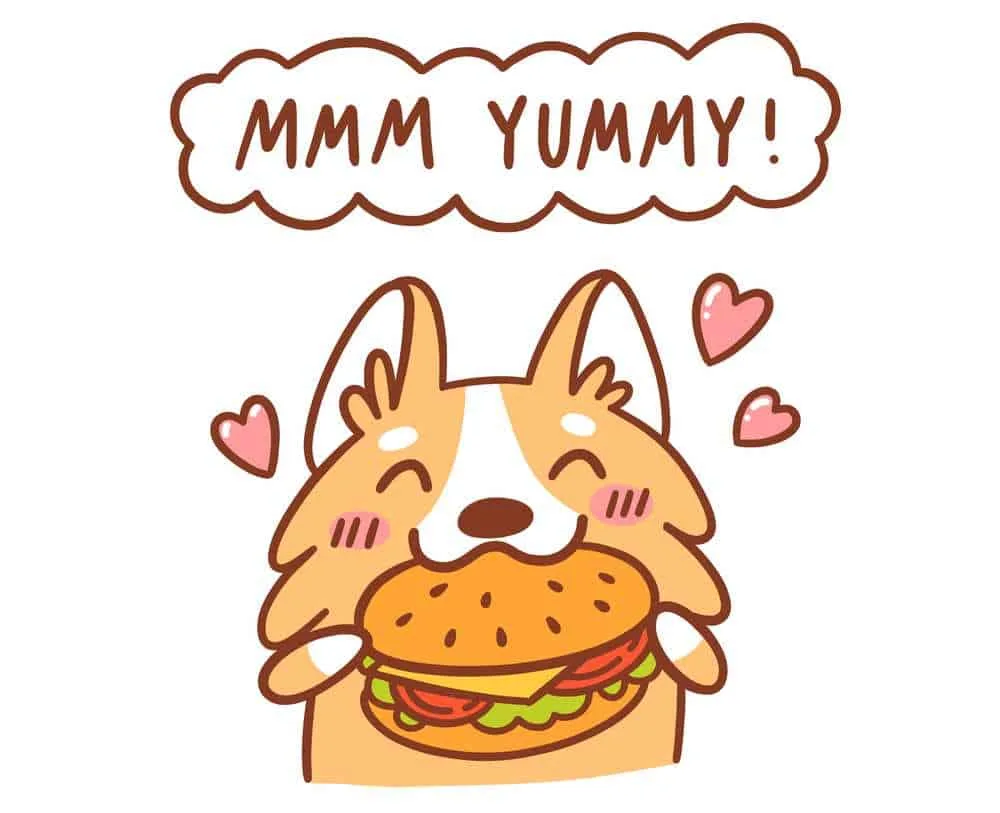
Why Should You Not Allow Your Corgi To Overeat?
As we have already mentioned, Corgis are prone to becoming overweight. In fact, this happens so often that there is even a prevailing belief among Corgi owners that these dogs should look round and pudgy. The corgi community is swamped with viral videos showing adorable overweight corgis strutting their butts.
It is wrong for so many reasons. Corgis should not look like loaves of bread. If your Corgi does look like one, he or she is obese and has a problem. Your dog cannot be blamed for its weight, though; you are the one who is responsible for his or her well-being.
A Corgi should have a slim body with a visible waistline. You should be able to see an abdominal tuck just below your pet’s ribcage. Many Corgi owners are not aware of this since vets often refrain from criticizing to avoid sounding rude or snarky.
Even though it is not the most pleasant thing to hear, it is still better to warn the owners that their dog is putting on too much weight early on. It is essential to raise awareness and educate Corgi lovers of just how important it is to maintain a healthy weight for their dogs.
It does not matter whether you have a Corgi or a German shepherd; every dog deserves an opportunity to live a long and happy life without dragging the extra poundage. If your Corgi is overweight, he or she cannot breathe, walk, run, or play like other dogs. You have to be responsible and contribute positively to the health of your dog. It is pure negligence to allow for your Corgi to become overweight.

Why Does Weight Matter That Much?
Corgis have long bodies and short legs, which means they are pretty low to the ground. Their spine carries quite a burden, and any extra poundage puts tremendous strain on it.
Corgis’ body structure makes them unique-looking and adorable, but, unfortunately, it also makes them prone to numerous hip, joint, and back problems. For example, these cute dwarfy canines often suffer from hip dysplasia and intervertebral disc disease (IVDD). Both of these conditions can be linked to excessive weight. Even your Corgi’s paws can become misshapen, compensating for the weight distribution!
The Veterinary Center of America (VCA) has issued a warning that excessive weight and obesity increase the risk of joint damage and can lead to osteoarthritis (OA) and chronic pain.
According to the VCA, the fat tissue is highly biologically active and discharges hormones and other chemicals which can cause or intensify inflammation in your dog’s body. The main culprit is the hormone leptin.
Fat cells produce leptin which infiltrates dogs’ joints and induces inflammation processes. It can also produce bone changes that are associated with OA.
The chain reaction continues since inflammation affects the natural response of your dog’s body to other hormones such as insulin and cortisol. In this way, it hinders the self-regulation processes and prolongs and intensifies the pain the dog feels. It is a vicious cycle that starts with a simple thing – too much fat in your dog’s body.
The problems do not end here; obese Corgis often have heart problems too. The weight puts a strain on their lungs as well. In order to prevent such detrimental health issues, you need to make sure your Corgi maintains a healthy weight.
For all the reasons stated above, weight matters A LOT for your Corgi. It matters for all dog breeds, but it is imperative to maintain a healthy weight for long-bodied dogs such as Corgis. Every extra pound puts a tremendous strain on their hips and joints due to their size and structure. The problems stack up rather quickly, and such dogs often require surgery which is a costly and traumatic intervention you would not wish on your beloved pet.
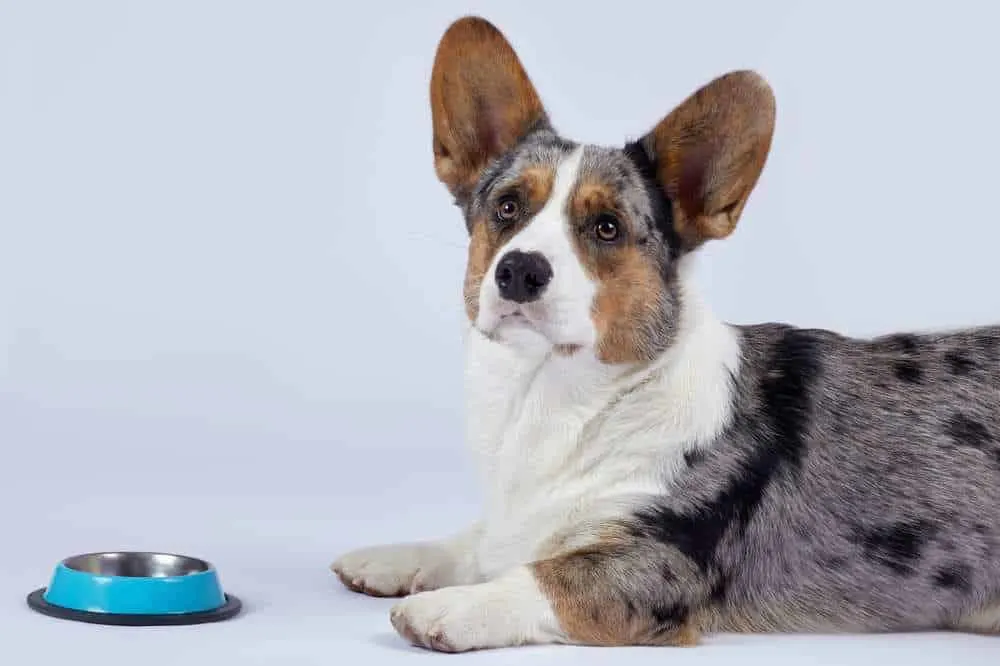
How Can You Prevent Obesity In Corgis?
Step 1: Do Not Allow Your Corgi To Overeat!
Corgis need a strict, well-balanced diet. It would be best to consult a vet if you are a first-time Corgi owner. Once you get a dietary plan, you need to make sure you follow it to the letter. Do not feel tempted to give your Corgi small treats or your leftovers – every calorie counts!
It would also be wise to divide your Corgi’s main meal into smaller portions and serve them throughout the day. Feeding your Corgi at the same time you have your breakfast, lunch, and dinner can help too. Your dog will not feel tempted to beg for food, and you won’t have to feel guilty for not indulging your four-legged friend.
Let us remind you once more: Never leave your Corgi alone with more food than he or she should eat! Corgis tend to overeat, and if their portions are not limited, they can eat too much and become sick or even die.
Often Corgis eat fast too. If you notice your dog devours an entire meal in a matter of seconds, he or she might have this problem as well. It is a serious issue you need to deal with as soon as possible since it can have terrible consequences, just like overeating.
Step 2: Make Sure Your Corgi Gets Enough Exercise Every Day!
Besides stringent feeding, your beloved Corgi needs a well-designed exercise regimen too. Corgis are agile herding dogs that are not meant to lay on your couch all day long. In order to maintain a healthy weight, these dogs need at least one long walk per day and an opportunity to run off the leash for at least half an hour.
You can find out more about Corgis’ exercise requirements here.
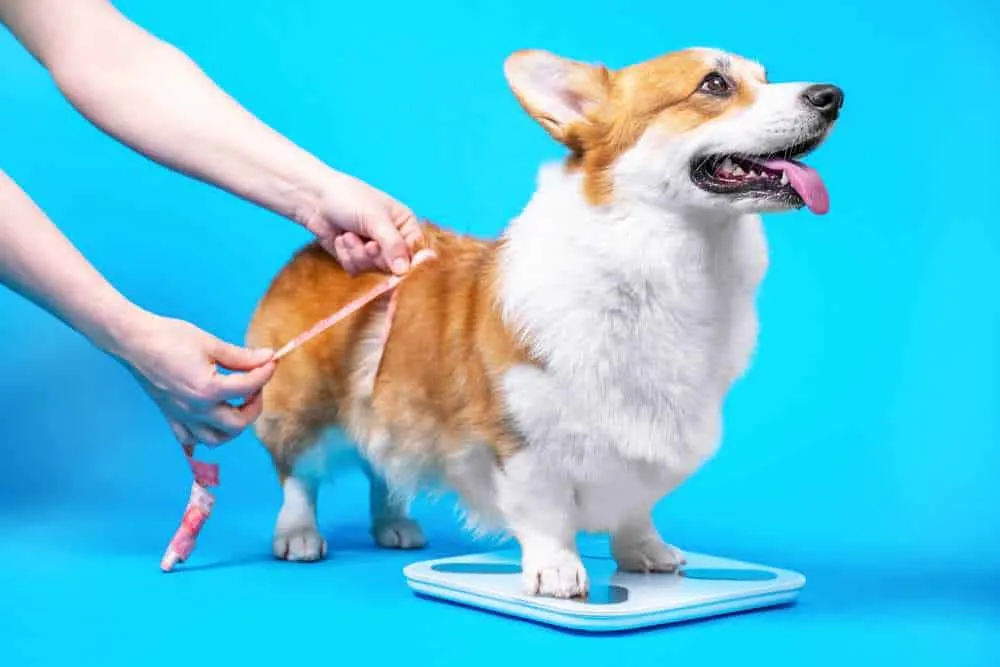
How Can You Know What Your Corgi’s Ideal Weight Is?
Not all Corgis are the same – they come in different shapes and sizes. A dog can have a healthy form no matter its weight. Therefore, both 32lbs Corgi and a 22lbs one can both be “fit”. Your Corgi might be shorter or taller than average or longer than standard, so it will not be that easy to calculate its ideal weight.
Nevertheless, as a responsible owner that you are, you need to know your dog is not overweight (or underweight) in order to make sure he or she is happy and healthy. So, how can you tell whether your pet is within the ideal weight range?
There is a method called body condition score. It serves to assess the current amount of fat your dog has. This is a subjective method for evaluating body fat in canines, and it combines two procedures:
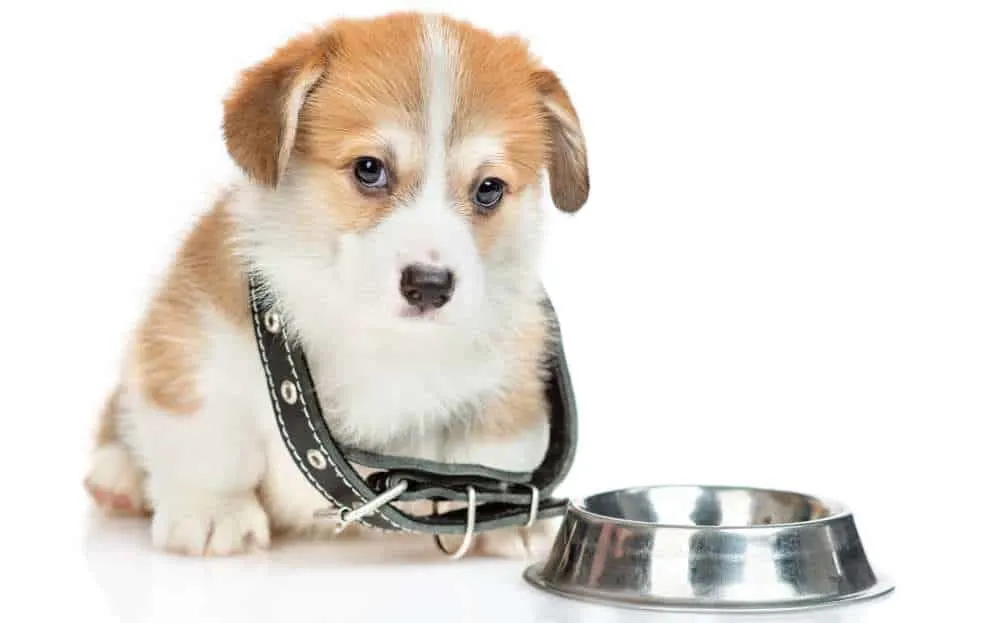
Visual Assessment
You should look at your Corgi from the side and top. First, you need to observe the dog’s waistline. If you can see an abdominal tuck right beneath your pup’s ribs, your Corgi is good to go. An hourglass waistline is a good indicator that your Corgi is in good shape and does not need any intervention. When it comes to side view, your dog should have highly-positioned hips and a deep chest.

Palpation
Palpation requires you to use your hands to try to feel your dog’s ribs, waist, abdominal tuck, and back all the way to the tail. You should not have any trouble feeling or counting your Corgi’s ribs if he or she is not overweight. On the other hand, if the ribs seem to stick out and feel sharp, your dog might be underweight.
It would be best to let your vet assess your Corgi’s body condition score since you can be subjective. The ideal score your pooch can get is between 4 and 5 on a scale of 9.
In order for your Corgi to have a perfect body structure and achieve the ideal score, you have to remember our advice: Make sure your dog is not overeating and provide plenty of exercise on a daily basis! A good optimum weight will guarantee a happy, healthy life for your Corgi no matter his or her age.
Learn More: How much should corgis eat?
Final Advice
Prevention is better than cure, and thus you need to take matters into your own hands and make sure you have complete control over your Corgi’s health. The following table should help you manage your dog’s weight and fitness level without too much stress:
| THE DO’S | THE DON’TS |
|---|---|
| Measure your dog’s food and count the calories. | Do not feed your dog any leftovers. Stay impervious to the begging. |
| Secure at least one long walk each day (ideally an hour long). | No overfeeding is allowed -EVER! Do not guess the amount; measure the proper portions. |
| Regularly check your dog’s condition and address any issues as soon as possible. | Do not wait for the health problems; act as soon as you notice your dog has gained the extra pounds. |
| Treats are a necessity but try to limit them and choose the low-calories ones. | Restrict your dog to a reasonable amount of treats per day and stick to that plan. Avoid high-calorie treats! |
| If you are concerned about your dog’s weight, take him or her to the vet. | Being fat or obese does not make your dog cute. It is dangerous! |
| Use the weekend to spend quality time with your dog by taking him or her for a long hike in nature. Corgis love the outdoors and will appreciate it! | Do not make your Corgi a couch potato – be active together! |
| Be honest to yourself when it comes to your dog’s weight! | Do not defend your dog’s problems with weight. Your dog is not big-boned or stout! |
Learn More: Why Do Corgis Get Fat? Are Corgis Naturally Fat?
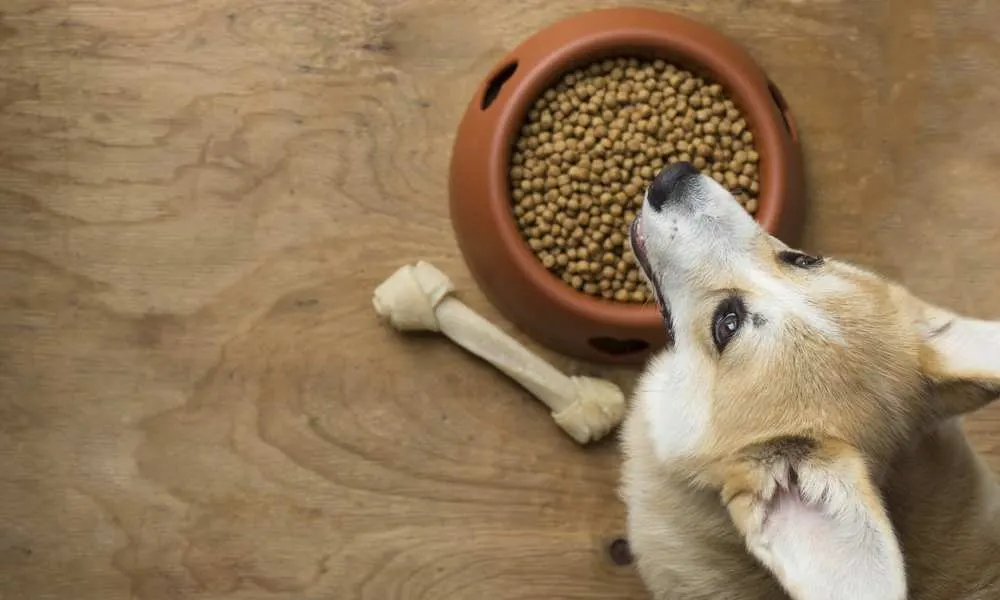
Conclusion
Corgis are prone to overeating, and that can cause some severe problems for these short-legged dogs. First and foremost, your Corgi can become overweight or obese. You might think a few extra pounds make your Corgi extra-cute as well, but you’re mistaken. The extra pounds endanger your Corgi’s health and well-being, even his or her life.
You need to be brutally honest with yourself and face the problem as soon as possible. We have made sure that you have all the information regarding preventative care and the topic of weight. If you have any further questions, we advise you to talk to your Corgi’s vet.
Dog obesity is one of the fastest-growing health problems, but it is preventable! You are your Corgi’s parent, and you have total control over how much he or she will eat. Do not feel tempted to overfeed your Corgi!

